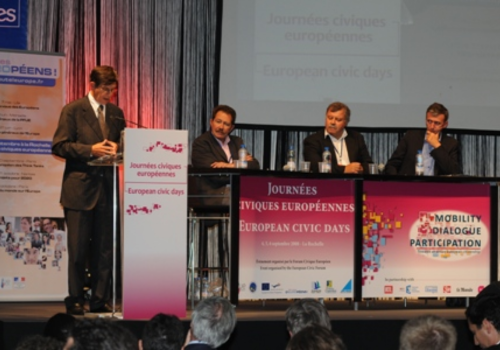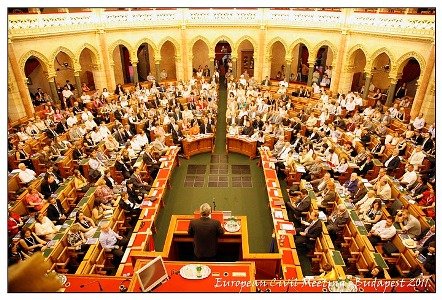Over the years, the European Civic Forum (ECF) has succeeded in giving a permanent framework to some important European public meetings in line with its ambitions to help developing and structuring the organised civil society across Europe and to formalise exchanges with the EU institutions.
Following the strong impact of the first European Civic Days held in La Rochelle in 2008 in the frame of the French EU Presidency, the ECF opened the way to a series of NGO forums accompanying the French, Swedish, Spanish, Hungarian, Danish and Lithuanian EU Presidencies. These events contributed not only to bringing the European debate to the national and local level and to reach a public often remote from the European challenges, but also to feed the European policy process with national and local concerns, so as to be better taken into account in the decision-making process.
Over seven years, more than 2,000 organisations representatives, politicians and citizens took part in these thematic days, which contributed not only to bringing the European debate to national and local level and reaching out to people often remote from current European agendas, but also to give voice to grassroots initiatives and concerns and bring them to the attention of the European leaders.
La Rochelle – 2008
On 4, 5, 6 September 2008 in La Rochelle, ECF organised the first European Civic Days, with the support of the European Commission, as a high-visibility event within the “Europe for citizens” program and as part of the “Paroles d’européens” public debate programme of the French Presidency of the European Union.
This event brought together some 1,000 representatives from more than 500 associations from across the European Union, from the Balkans, from Turkey, from Russia, from Ukraine and from Moldavia, to share their experience and working methods and build up a strong Europe-wide network. As privileged intermediary bodies between public institutions and citizens, associations fulfil an essential civic function, actively contribute to reinvigorate politics and help citizens identify more closely with the European perspective. We therefore consider it vital to give more credit and visibility to these organizations whose commitment brings a welcome democratic fillip to a European Union facing renovation.

Malaga – 2010
Within the framework of the Spanish Presidency of the 27 and on 7, 8 and 9 May, the provincial council of Málaga welcomed 650 participants from the 21 countries in the European Union. Managers, volunteers, activists, academics, experts and active members of the organised civil society from hundreds of European NGOs met for three days to work towards a common objective: progress in the construction of a set European social citizenship. The fight against social exclusion, for human rights, education in European civic values, equality, public social services and interculturality were just some of the open challenges covered by the workshops.
As well as reflecting, regaining, sharing and learning, one of the basic objects of European Civic Days 2010 was to set up a dialogue with the institutions and to achieve good understanding to tackle social problems and needs from a joint point of view.

Budapest – 2011
ECF took part in the associative forum organized by Szazadveg Political School Foundation as part of the Hungarian Presidency of the EU, following the experience of the European Civic Days in La Rochelle (2008, France) and Malaga (2009, Spain). This high-profile conference was an opportunity to reaffirm the key values defended by ECF in its promotion of a European Union based on integration, because we believe that the construction of Europe cannot be reduced to a simple juxtaposition of national positions. The perception of Europe presupposes the creation of a public space for dialogue and cooperation, enabling the participation of civil society organizations in the decision-making process, with greater impact and legitimacy. Read the programme (in Hungarian)

Vilnius – 2013
Athens – 2014
The 2014 edition was somewhat particular. Example of the failure of the neoliberal paradigm and current European policies to insure well-being for all, Greece has been presiding the Council of the EU for this first semester 2014, facing tough financial and economic challenges, a high level of unemployment and recession, the out-coming of which can be read in the ballot boxes last month during local and European elections. In the general transitional period we find ourselves in, we need to seek ways to overcome this ideological crisis and fragmentation of driving forces in order to scale up local fights and give them a global, transformative dimension. We need to reconnect politics with the grassroots and help translate local fights and resistance into political action.
This year’s forum looked at key challenges stemming from the European Year(s) of Citizens legacy and bridging the way to the European Year for Development, basing on two reference documents:
- ECF manifesto Equality, Solidarity and Democracy for Europe;
- the European Year of Citizens’ Alliance – EYCA policy recommendations It’s about us. it’s About Europe.
Click here to have a full overview of the programme.
Strasbourg – 2015
The 2015 edition was somewhat particular. Example of the failure of the neoliberal paradigm and current European policies to insure well-being for all, Greece has been presiding the Council of the EU for this first semester 2014, facing tough financial and economic challenges, a high level of unemployment and recession, the out-coming of which can be read in the ballot boxes last month during local and European elections. In the general transitional period we find ourselves in, we need to seek ways to overcome this ideological crisis and fragmentation of driving forces in order to scale up local fights and give them a global, transformative dimension. We need to reconnect politics with the grassroots and help translate local fights and resistance into political action.
This year’s forum looked at key challenges stemming from the European Year(s) of Citizens legacy and bridging the way to the European Year for Development, basing on two reference documents:
- ECF manifesto Equality, Solidarity and Democracy for Europe;
- the European Year of Citizens’ Alliance – EYCA policy recommendations It’s about us. it’s About Europe.
Click here to have a full overview of the programme.
This year’s edition was exceptionally held in Strasbourg to celebrate ten years since the creation of the European Civic Forum in the Council of Europe. It gave the opportunity to gather more than 200 participants from all across Europe to take stock of political, institutional and social challenges facing Europe in the last decade and envision ways forward towards a renewal of the European project around core values of Equality, Solidarity and Democracy.
In a context when the European Union is suffering from a growing popular disenchantment, when the belief in its ability to secure collective well-being has been seriously undermined along with the economic and social crisis, but also, more recently, with the refugees flow, the European Civic Forum (ECF) has been working for ten years to reinforce civic participation for a Europe grounded on Solidarity, Democracy and fair access to rights for all.
Complete information about the event can be found on the event’s page. See further information by clicking on the event’s webpage


